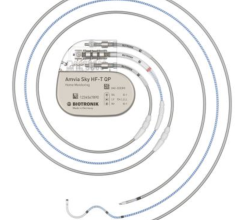May 13, 2009 - Medtronic Inc. today announced the start of a nationwide trial to examine the relationship between the company’s OptiVol Fluid Status Monitoring technology and the ability to predict worsening heart failure, a leading cause of hospitalizations worldwide.
The trial will assess whether more frequent (monthly vs. quarterly) review of patient data results in earlier clinical intervention. Previous studies have demonstrated that monitoring fluid trends in the chest cavity using OptiVol identified patients more likely to have subsequent heart failure events, such as shortness of breath, fatigue, tissue swelling due to fluid build up, and decompensation or deterioration of heart function leading to hospitalizations. However, most physicians today rely on nonspecific measures, such as patient weight, in an effort to detect worsening heart failure.
The commencement of the OptiVol Care Pathway trial complements a data analysis that will be presented during Heart Rhythm 2009, the annual scientific sessions of the Heart Rhythm Society, which utilized de-identified data aggregated in the Medtronic Discovery Hub on more than 43,000 ICDs and CRT-Ds. The analysis examined the association between worsening heart failure as indexed by OptiVol and atrial and ventricular tachyarrhythmias (AT and VT). Results from the analysis will be presented at the session, “Decreases in Intrathoracic Impedance Are Associated with Atrial and Ventricular Tachyarrhythmias: An Analysis of 43,356 CRT-D and ICD Devices,” at 10:45 a.m. Friday, May 15, in Room 255 at the Boston Convention and Exhibition Center.
OptiVol Care Pathway is a prospective, randomized, multicenter, clinical trial that will assess the impact of monthly vs. quarterly review of OptiVol with Cardiac Compass Trend information on patient care. The study is expected to enroll approximately 1,500 patients at up to 200 sites; patients will be followed for 12 months. Principal investigator is W.H. Wilson Tang, M.D., assistant professor of medicine at the Cleveland Clinic Lerner College of Medicine of Case Western Reserve University. First enrollments in the OptiVol Care Pathway trial took place at Metropolitan Cardiology Consultants (Coon Rapids, Minn.) by Amin Rahmatullah, M.D., and Carolina Heart Specialists (Gastonia, N.C.) by Mark Thompson, M.D.; enrollments continue at centers nationwide.
OptiVol is found on Medtronic’s latest wireless defibrillators (Consulta and Concerto CRT-Ds, Secura and Virtuoso ICDs), and has been available on Medtronic devices since FDA approval in 2004. OptiVol fluid status monitoring uses low-level electrical pulses that travel across the thoracic cavity (the chest area encompassing the lungs and heart) to measure the level of resistance, indicating fluid in the chest – a common sign of heart failure. Since normal fluid levels vary from patient to patient, and fluid accumulation can be either slow or rapid, OptiVol’s ability to measure fluid status trends over time in conjunction with other key device trends and physiologic measures available in Medtronic’s proprietary Cardiac Compass Reports can provide the opportunity to intervene before patient symptoms develop. As of Jan. 1, 2009, the U.S. Centers for Medicare and Medicaid Services have begun reimbursing physicians for their time spent monitoring heart failure patients using fluid trend data obtained from Medtronic implantable cardiac devices via CareLink Network remote transmission.
1. "Heart Disease and Stroke Statistics 2009 Update." A Report From the
American Heart Association Statistics Committee and Stroke Statistics
Subcommittee. Circulation, published online Dec. 15, 2008
For more information: www.medtronic.com


 July 02, 2025
July 02, 2025 









